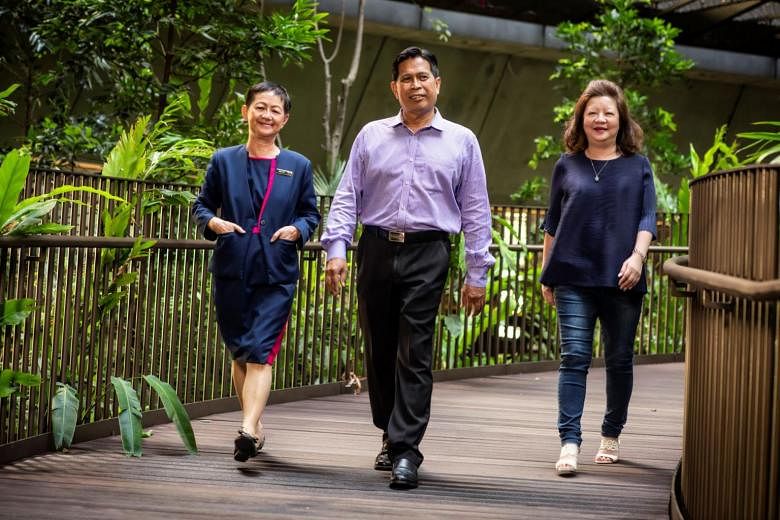The traditional concept of retirement has been, well, retired at Prudential Singapore.
The insurer is one of very few companies here that has done away with the notion of retirement for all its employees, including long-serving staff like Ms Sue Li, 64, Mr Abdullah Rahim and Ms Mary Goh, both 62.
They have been working for Prudential Singapore for between 25 and 42 years and are keen to keep going, despite having hit the retirement age of 62.
The company's move to do away with traditional retirement means that, theoretically, staff with exceptionally good health and long lives can opt to work up to 100 and beyond, and on the same employment terms.
Prudential Singapore has also taken the unusual step of maintaining its employer Central Provident Fund (CPF) contributions to all employees at 17 per cent, regardless of age.
Normally, such contributions are reduced progressively for older employees, such as to 13 per cent (from age 55), 9 per cent (from age 60) and 7.5 per cent (above age 65).
But to enjoy this perk, older employees have to maintain their own CPF contributions at 20 per cent, like younger employees.
This unusual human resource practice is in line with the company's "Saving for 100" campaign that aims to promote lifelong financial prudence and sustainability, as the average longevity of Singaporeans is expected to increase.
Prudential Singapore chief executive Dennis Tan says: "If we are asking people to save for 100, we must walk the talk and start with ourselves.
"Looking at this holistically, if people are expected to live much longer, then 'retirement age' should not be fixed.
"Employees can choose to work much longer if they so desire."
Service with a smile
Ms Li, who has been handling customer service at Prudential for over 25 years, says nothing fazes her, not even when customers are unreasonable or just plain rude.
What matters more is what she does for the customers and how she can serve them better.
"When a customer walks away feeling happy and good, that makes my day," she says.
Once, while she was manning a cashier's counter, a customer turned up to make payments and she greeted him with a cheerful "Good morning, sir!"
But the man replied curtly: "What's so good about the morning?"
While she was a bit taken aback, she remained calm and continued to process the payment.
She also wished the man "a good day" and that he would have a great weekend too.
This time, her cheerful nature touched the customer.
"He looked surprised and asked me, 'You are not angry with me?'
"I told him I wasn't, and hoped his day would get better.
"He seemed impressed and muttered 'Good!' as he walked away."
Such encounters make her even more determined to continue working through her golden years to do her part to improve customer service.
She says: "I am happy to continue working and learning new things, as I believe that learning is a lifelong journey, even for people who may have years of experience."
Adaptability
Never assume that workers in their 60s are "outdated" and do not have special skill sets.
On the contrary, many older workers are more keen to learn and upskill than younger ones, because many have seen the advantages of going with the flow when workplace conditions change.
Mr Abdullah, a customer service officer, can testify to the benefits of learning new skills in his 32-year career with the company.
When automatic payment system Giro was introduced years ago, he took the opportunity to learn everything about the system, including the various procedures involved in processing applications.
He was so good at it that he became "the Giro man" of sorts, not only helping customers apply for such schemes but also convincing his relatives and friends to switch to Giro payment.
Such skills are even more relevant today, especially in helping customers adopt a cashless scheme for recurrent bills.
Product knowledge
One big plus that diligent, long-serving employees have over younger staff is their bank of "institutional knowledge".
Ms Goh, who has been a policy services officer for 42 years, is the go-to person whenever anyone is unclear about the different types of insurance products sold throughout the years.
"I can help fill in any knowledge gaps that my younger colleagues may have, as they may be less familiar with certain types of policies that are before their time," she says.
This is why many companies are reluctant to let such employees leave because it is hard to replace people with such knowledge.
While Ms Goh hopes to stop working in a few years, she is glad that she is still employed at her age.
She says: "I have some friends who are already retired and they seem quite bored.
"At least I have work to keep me active, and I can still go for the occasional holiday overseas."


